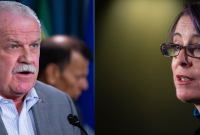Support strong Canadian climate journalism for 2025
In an ideal world, this week’s French-language leaders’ debate — the first to include the prime minister — would’ve included a rigorous discussion of the real impact of the parties’ competing climate plans, and I could speak now about the accuracy of claims on emissions reductions and the like. As it is, we will have to talk about the two airplanes.
The issue arose toward the end of a mostly platitude-level discussion of “economy and the environment.” By way of explaining (again) why carbon pricing is bad, Conservative Leader Andrew Scheer turned to Justin Trudeau and said (in the CPAC English translation), “You’re very hypocritical... there’s only one leader who has two planes.”
And thus did tout le monde learn that the Liberal campaign is using two chartered airplanes for its travel: one for the PM, his staff and the media, and the other for Trudeau’s “costumes and canoe,” as Scheer put it. (Credit where due: easily the best burn of the evening.) The Conservatives clearly planned the attack ahead of time, because their social media feeds quickly filled with viral videos and shareable images calling out Trudeau’s “hypocrisy” for taxing the Canadian public’s emissions while operating two passenger jets for his campaign.
I’d like to gauge the accuracy of this line of attack on three levels. First, at the most basic level, it’s true. The Liberals are using two planes, and the second one is being used rather luxuriously to prepare event sites and so forth ahead of the campaign’s arrival. Two airplanes indubitably burn more fuel and generate more emissions — roughly twice as much, depending on the model of aircraft, the prevailing winds and all that jazz.
On another level, the Liberals have quickly pointed out that they purchased carbon offsets for their air travel through Less Emissions, a subsidiary of Bullfrog Power. By paying this premium they are funding the Essex-Windsor Regional Landfill Gas Capture and Destruction project. There are many caveats to offsetting emissions, but it’s a common practice, and companies has been doing it without controversy for years.
But on the only relatively important level — I say “relatively” because the whole discussion is of so little relevance to Canada’s collective action on climate change that we may as well be discussing the carbon footprint of the catering at campaign events — there is the question of whether Scheer’s “hypocrisy” claim holds water. Let’s dig a bit deeper on that.
Consider the centrepiece of the Liberals’ climate plan: the carbon tax. The core logic of a carbon tax is that the best way to change collective behaviour on climate change is to make polluting activities more expensive. In lieu of, just for instance, curtailing air travel altogether, the carbon tax makes flying a bit pricier. If, again, just for instance, the managers of a national election campaign still want to fly, they can pay more. Choosing to pay even more through voluntary offsets on top of whatever surcharge the carbon tax builds into their flights only underscores the argument the Liberals are making to all Canadians, which is that if your activities generate emissions, those activities should cost more. This is not hypocrisy, but pretty tidy logical consistency.
Hypocrisy, on the other hand, might be, yet again, just for instance, spending the first weeks of the campaign (and the first several pages of your climate-policy brochure) spreading falsehoods about the impact of carbon taxes and then attacking your opponent on national TV over an inconsequential climate-related detail, all to mask the utter lack of substance in your own climate plan.
I hope, almost certainly in vain, this will be the last we hear about the emissions created by campaign travel.
Editor's note: This story was updated on Oct. 4, 2019 at 3:13 p.m. ET to correct an error that said the Liberal offsets were purchased through Bullfrog and helped offset emissions via its clean energy projects. The offsets were purchased through Less Emissions, a Bullfrog subsidiary, and involved a specific gas capture project.






Comments
There is a serious problem with how the National Observer is covering this election, with this opinion piece being only the latest example. Repeatedly, NO prints slanted stuff that appears intended to get the Liberals re-elected. They've given the disastrously bad environment minister, Catherine McKenna, a platform for her propaganda--more than once. There was the recent scare-piece called "Will Andrew Scheer ruin Canada?" featuring a cartoon attack that the Liberals wouldn't stoop to. Now we get excuses for why it's OK to fly twice as many planes. Come on.
NO's behaviour is unworthy of any organization claiming to produce journalism. That's why I'm unsubscribing from the email newsletter.
Try to read the source of the piece before lamenting the outcome, perhaps? This is an Opinion piece written by John Turner, so of course it's going to have a liberal slant. The National Observer has a tendency of publishing the 'struggles of the oil industry', as well. I don't find this opinion 'agreeable' either, for the record. If you've been reading the National Observer for longer than 6 months, you'd know this is an introspective glance at where they stand, not a vindication of the Liberal Party. Environmentally conscious people know this. Or, unsubscribe every news sources across Canada, if you find op-eds in a journal represent their actual stance on any matter. Because, personally, if you unsubscribe, you are going to lose out on some extremely vital information. (treat this like an opinion, ...)
Christ Turner, sorry! Works for MacLean's and GlobeandMail ...
As a matter of fact, I've been reading NO for over 2 years, you arrogant snot.
Thanks so much for your comment, Vivian, and I hope you'll reconsider unsubscribing -- we really appreciate your readership. With respect, this particular oped was in regard to the airplanes, but we've also run stories like the below, and I'm not sure they would fit the description above:
https://www.nationalobserver.com/2019/10/09/opinion/trudeau-formula-sho…
https://www.nationalobserver.com/2019/09/26/opinion/looking-canadian-ra…
And more in the news section: https://www.nationalobserver.com/2019/07/16/analysis/we-fact-checked-tr…
https://www.nationalobserver.com/2018/01/22/news/paternalistic-first-na…
https://www.nationalobserver.com/2019/03/08/analysis/hidden-key-snc-lav…
The level of hypocrisy of both major parties is definitely causing my gag reflex to react frequently, whether it's carbon spewing airplanes, scare-tactics about job-killer carbon taxes, the casual purchase of pipelines, secret support from the petroleum industry; the list is almost endless. Besides, even Greta Thunberg gets criticized for taking a sailboat across the Atlantic because that option is not open to everyone. Really.
I still think that if all the posturing politicians of the major parties stayed home, instead of flocking to meetings in another country to sing songs about what deadlines they're going to meet in 30 years, well after they've left their mess to somebody else (ie our children), or instead of prancing around the country trying to convince us they're serious about climate change or that it's not a problem, it would make a noticeable difference in our carbon footprint.
It still leaves me with the question: What kind of a jolt will it take to make the leadership of major parties take climate change seriously as a major impact on the country's well-being?
Addendum:
Elizabeth May and the Greens apparently are taking the train.
Personally, I think Carbon Credit purchases are a Carbon Cop-out for those who want a quick out for their carbon spewing habits. Carbon Credits have the effect of nullifying the carbon reduction benefits of the credit producer with the emissions of the purchaser, and delay necessary reduction changes by the carbon emitter. So, no credit to Mr. Trudeau and his Carbon Cop-out Credits, and no got-ya credits to Mr Sheer and his own party's carbon performance. Failing grades all-round.